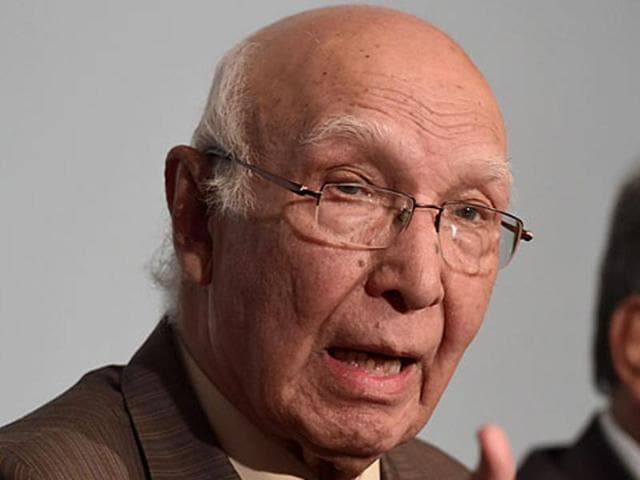US shouldn’t add to strategic imbalance in South Asia: Sartaj Aziz
The US should not increase “conventional and strategic imbalance” in South Asia at a time when relations between Pakistan and India are tense, Pakistan’s national security advisor Sartaj Aziz has said.
The US should not increase “conventional and strategic imbalance” in South Asia at a time when relations between Pakistan and India are tense, Pakistan’s national security advisor Sartaj Aziz has said.

Aziz made the remarks days ahead of Prime Minister Nawaz Sharif’s October 20 visit to the US for talks with President Barack Obama. Reports in the US media have suggested the Obama administration is eyeing a possible deal to give Pakistan access to atomic technology in exchange for caps on its nuclear arsenal.
“The US can maintain whatever kind of relations it desires with India, but at a time when there are tensions between India and Pakistan, at least it should not increase the conventional and strategic imbalance so that becomes a threat to the region,” Aziz said in an interview with BBC Urdu.
Read | Stalled India-Pakistan talks to figure in Sharif-Obama meeting
Sharif will hold talks with Obama on a range of issues, including deeper trade and economic ties, the security situation in Afghanistan, India-Pakistan relations and access to nuclear technology for developing clean and renewable energy sources, he said.
However, Pakistan will not make any compromises on its atomic arsenal while talking about nuclear issues, he indicated. “Our basic point is that there will be no compromise on national interests and security, which we will safeguard completely,” he said.
Aziz contended that the India-US civil nuclear deal had not resulted in any significant outcome and India had not yet become a member of the Nuclear Suppliers Group (NSG). “I am hopeful that Pakistan and India will together become members (of the NSG),” he said.
Pakistan has been holding talks with the US for several years on nuclear issues, including nuclear security and export controls, and the world community is “happy” with the security system put in place by Islamabad for its nuclear arsenal, he said.
He added: “Pakistan has to be part of the global (nuclear) infrastructure, including the NSG, FMCT and other institutions.” Some of the issues holding up Pakistan from joining the nuclear “mainstream” were linked to international bodies and others to the US, he said.
Asked about a possible US role in mediating between India and Pakistan, Aziz said this had been discussed in the past. During his visit to India earlier this year, Prime Minister Sharif had said the two sides had no option but to hold a dialogue to settle outstanding issues, he added.
“Other countries also believe that these issues can be resolved only through talks. The (regional) imbalance should not increase and ceasefire violations should stop,” he said.



